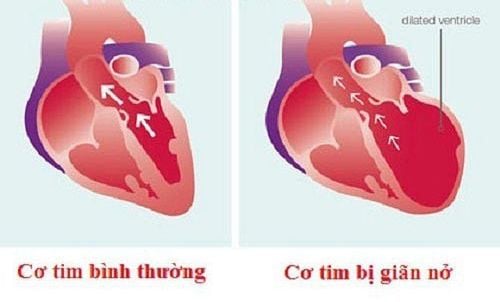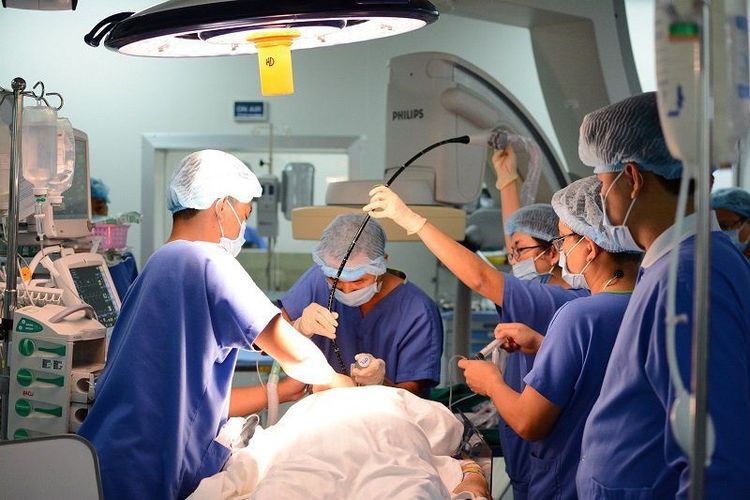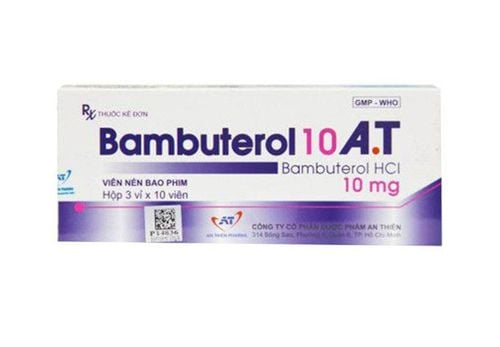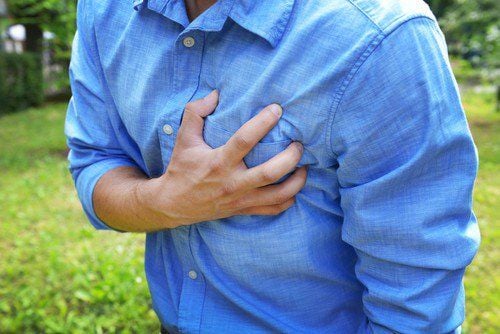This is an automatically translated article.
The article is professionally consulted by MSc Pham Van Hung - Interventional Cardiologist, Vinmec International Hospital Da Nang.You often feel tired, short of breath when lying down or exerting yourself, worse, having difficulty breathing even when doing normal things like personal hygiene or even when resting. Those are just simple symptoms but it is also a sign of dilated cardiomyopathy - a heart disease. To help you recognize the signs of dilated cardiomyopathy as well as to prevent and properly treat this disease, here is the advice of cardiologist Pham Van Hung, Vinmec General Hospital Da Nang.
1. What is dilated cardiomyopathy?
Dilated cardiomyopathy is a syndrome of left ventricular dilatation with an increase in predominantly left ventricular ventricular mass with systolic or diastolic dysfunction without primary pericardial, valvular, or ischemic injury. heart muscle. Dilated cardiomyopathy usually begins in the left ventricle - the heart's main pumping chamber. The left ventricle is dilated, then the entire chambers of the heart are enlarged. When the heart's chambers dilate, the heart muscle does not contract normally and cannot pump blood as well as a healthy heart.
2. Manifestations and signs of recognition
Dilated cardiomyopathy has a silent onset, and may not initially cause symptoms that are large enough to impact quality of life. However, many patients still have obvious symptoms. People with dilated cardiomyopathy often have signs and symptoms of heart failure or arrhythmias. Signs and symptoms include:Fatigue. Shortness of breath during activity or lying down. Reduced exercise capacity. Swelling in the legs, ankles and feet. The abdomen swells due to fluid accumulation (ascites). Angina, but only if ischemic heart disease is present. There is an abnormal sound when listening to the heartbeat (whisper). Angina is one of the manifestations of dilated cardiomyopathy.
3. Cause
In many cases, dilated cardiomyopathy has no obvious cause. However, the causes of dilated cardiomyopathy can be divided into the following main groups of factors:3.1. Heredity Genetic causes account for about 25-50% of cases of dilated cardiomyopathy. The role of genetic factors is illustrated by studies that have documented familial dilated cardiomyopathy. People with dilated cardiomyopathy inherited from their parents often have HLA-DR4, the HLA-DQA1 allele 0501 has also been reported at a high rate. Some pre-existing diseases such as:
Viral myocarditis: Dilated cardiomyopathy can be a late sequela of acute viral myocarditis, caused by enteroviruses, especially Coxsackie B virus. Myopathy heart rate due to tachycardia. Coronary heart disease, heart attack, high blood pressure, diabetes. Viral hepatitis and HIV. Thyroid disease. Inflammatory diseases such as sarcoidosis and connective tissue diseases. Muscular dystrophy. Tuberculosis: 1% - 2% of TB patients have dilated cardiomyopathy. 3.2. Due to Toxic Factors Alcohol abusers, especially those with a poor diet, have high rates of cardiomyopathy. Some toxic metals such as cobalt, lead, mercury, etc. Some drugs (such as cocaine and amphetamines) and some drugs used in cancer chemotherapy (doxorubicin and daunorubicin). Cocaine abuse. 3.3. Autoimmune mechanisms Several animal studies have shown that dilated cardiomyopathy is an autoimmune disease. It is estimated that 30-40% of adults with dilated cardiomyopathy have a specific physical condition and a specific autoantibody pathology. Antibody deficiencies in these individuals are associated with advanced stages of the disease.
3.4. Some other causes such as Pregnancy: Dilated cardiomyopathy can occur in late pregnancy or weeks or months after delivery. Thiamine deficiency. Dilated cardiomyopathy can occur in late pregnancy or weeks or months after birth.
Dilated cardiomyopathy is a disease that can occur at any age, but the age at greatest risk is middle-aged and young adults between 20 and 50 years old. Subjects at high risk for dilated cardiomyopathy are those in the following groups:
Men, ages 20 to 50. There is a family history of dilated cardiomyopathy. Ever damaged heart muscle from a heart attack.

4. Treatments
Treatment of dilated cardiomyopathy according to the principle of treatment according to the degree of severity from mild to severe. Depending on the severity of the disease, use one of the following methods or a combination of the following methods:4.1. Drug treatment Drug treatment can slow progression and in some cases even improve heart condition. The indicated drug classes may include:
Beta blockers: The group of beta blockers is a widely used and popular drug class. β-blockers reduce myocardial oxygen demand, inhibit the vasoconstrictor activity of the sympathetic system, reduce catecholamine toxicity to cardiomyocytes, and reduce the risk of death due to ventricular arrhythmias. . Close monitoring during treatment is necessary because it can worsen heart failure as well as trigger asthma attacks in people with a history of asthma. Verapamil: This is a calcium channel blocker. Verapamil is also commonly used to prevent angina attacks and control tachycardia. Currently rarely used. Angiotensin-converting enzyme (ACE) inhibitors: The role of this class of drugs is to reduce afterload and reduce myocardial cell remodeling. Diuretics: This class of drugs is used to reduce fluid retention and reduce preload on the heart. Anticoagulants may also be used for antithrombotic treatment. There is some evidence for the benefit of coenzyme Q10 in the treatment of heart failure. 4.2. Surgical treatment Heart transplant: In patients with advanced disease, a heart transplant may be considered. For these subjects, the 1-year survival rate was 90%, and over 50% survived for more than 20 years. Cardiac transplantation is the most recent best treatment modality for medically refractory dilated cardiomyopathy. Temporary surgery: Resection of the enlarged ventricular muscle and mitral valve replacement have also been shown to improve symptoms, but it still does not change the nature of the disease.
Pacemaker placement: Pacemaker placement is necessary for patients with bradycardia Stem cell transplant: heart muscle stem cells are transplanted to replace dead heart muscle cells. Although considered a promising method, this technique still needs research and is rarely applied in clinical practice. 4.3. Appropriate nutrition and self-care 4.3.1. People with dilated cardiomyopathy and cardiovascular diseases in general should eat foods such as: Bananas and other fruits such as oranges, tangerines, cantaloupe. Legumes, especially soybeans, contain a lot of protein, vitamins, ... help regulate heart rate, balance blood pressure, maintain stable blood sugar index to help prevent cardiovascular disease. Cereals, oats. Green vegetables. Fish and mushrooms. 4.3.2. People with dilated cardiomyopathy need to limit foods High in salt: Foods with high salt content can raise blood pressure and increase the risk of heart attack and stroke. Food contains a lot of fat. Rest during heart failure. Exercise regularly with small intensity, avoid vigorous physical activity.
5. Advantages when treating cardiovascular diseases at Vinmec
Since its inception, the Cardiovascular Center at Vinmec has built and developed with the orientation to become the leading Cardiovascular Center in Vietnam and the region. To realize this goal, Vinmec has equipped with the most advanced machinery system such as: CT 640 (Toshiba), MRI 3 Tesla machine (Siemens), high-end endoscopic equipment EVIS EXERA III (Olympus). Japan), Hybrid operating room according to international standards, Avace advanced anesthesia system,...
Currently, the hospital has applied the technique of spinal erector plane (ESP) anesthesia for open heart surgery, there is no longer a fear of postoperative pain. Vinmec becomes one of the best choices for surgery and treatment of cardiovascular disease.
Together with Vinmec protect you and your family against the risk of cardiovascular complications.
Please dial HOTLINE for more information or register for an appointment HERE. Download MyVinmec app to make appointments faster and to manage your bookings easily.














